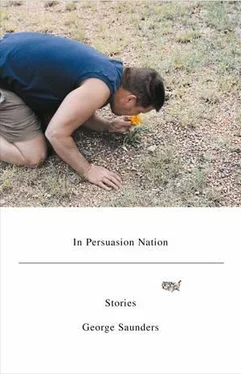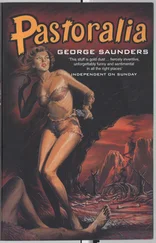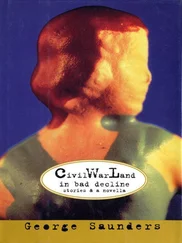"What did they do to you in there, Ed?" said Art. "Did they mess with you?"
"No, they didn't," said Eddie. "I just a say to them, ‘Leave a guy alone!' I mean, sometime they did, O.K.? Sometime that one guy say, ‘Hey, Eddie, pull your thing! We gone watch you.' "
"O.K., O.K.," said Art.
At dusk, the three of us would go to Mrs. H.'s porch. She'd bring out cookies and urge forgiveness. It wasn't Poltoi's fault her heart was small, she told us. She, Mrs. H., had seen a great number of things, and seeing so many things had enlarged her heart. Once, she had seen Göring. Once, she had seen Einstein. Once, during the war, she had seen a whole city block, formerly thick with furriers, bombed black overnight. In the morning, charred bodies had crawled along the street, begging for mercy. One such body had grabbed her by the ankle, and she recognized it as Bergen, a friend of her father's.
"What did you do?" said Raccoon.
"Not important now," said Mrs. H., gulping back tears, looking off into the quarry.
Then disaster. Dad got a check for shoulder pads for all six district football teams and, trying to work things out with Mom, decided to take her on a cruise to Jamaica. Nobody in our neighborhood had ever been on a cruise. Nobody had even been to Wisconsin. The disaster was, I was staying with Poltoi. Ours was a liquor household, where you could ask a question over and over in utter sincerity and never get a straight answer. I asked and asked, "Why her?" And was told and told, "It will be an adventure."
I asked, "Why not Grammy?"
I was told, "Grammy don't feel well."
I asked, "Why not Hopanlitski?"
Dad did this like snort.
"Like that's gonna happen," said Mom.
"Why not, why not?" I kept asking.
"Because shut up," they kept answering.
Just after Easter, over I went, with my little green suitcase.
I was a night panicker and occasional bed-wetter. I'd wake drenched and panting. Had they told her? I doubted it. Then I knew they hadn't, from the look on her face the first night, when I peed myself and woke up screaming.
"What's this?" she said.
"Pee," I said, humiliated beyond any ability to lie.
"Ach, well," she said. "Who don't? This also used to be me. Pee pee pee. I used to dream of a fish who cursed me."
She changed the sheets gently, with no petulance-a new one on me. Often Ma, still half asleep, popped me with the wet sheet, saying when at last I had a wife, she herself could finally get some freaking sleep.
Then the bed was ready, and Poltoi made a sweeping gesture, like, Please.
I got in.
She stayed standing there.
"You know," she said. "I know they say things. About me, what I done to that boy. But I had a bad time in the past with a big stupid boy. You don't gotta know. But I did like I did that day for good reason. I was scared at him, due to something what happened for real to me."
She stood in the half-light, looking down at her feet.
"Do you get?" she said. "Do you? Can you get it, what I am saying?"
"I think so," I said.
"Tell to him," she said. "Tell to him sorry, explain about it, tell your friends also. If you please. You have a good brain. That is why I am saying to you."
Something in me rose to this. I'd never heard it before but I believed it: I had a good brain. I could be trusted to effect a change.
Next day was Saturday. She made soup. We played a game using three slivers of soap. We made placemats out of colored strips of paper, and she let me teach her my spelling words.
Around noon, the doorbell rang. At the door stood Mrs. H.
"Everything O.K.?" she said, poking her head in.
"Yes, fine," said Poltoi. "I did not eat him yet."
"Is everything really fine?" Mrs. H. said to me. "You can say."
"It's fine," I said.
"You can say," she said fiercely.
Then she gave Poltoi a look that seemed to say, Hurt him and you will deal with me.
"You silly woman," said Poltoi. "You are going now."
Mrs. H. went.
We resumed our spelling. It was tense in a quiet-house way. Things ticked. When Poltoi missed a word, she pinched her own hand, but not hard. It was like symbolic pinching. Once when she pinched, she looked at me looking at her, and we laughed.
Then we were quiet again.
"That lady?" she finally said. "She like to lie. Maybe you don't know. She say she is come from where I come from?"
"Yes," I said.
"She is lie," she said. "She act so sweet and everything but she lie. She been born in Skokie. Live here all her life, in America. Why you think she talk so good?"
All week, Poltoi made sausage, noodles, potato pancakes; we ate like pigs. She had tea and cakes ready when I came home from school. At night, if necessary, she dried me off, moved me to her bed, changed the sheets, put me back, with never an unkind word.
"Will pass, will pass," she'd hum.
Mom and Dad came home tanned, with a sailor cap for me, and, in a burst of post-vacation honesty, confirmed it: Mrs. H. was a liar. A liar and a kook. Nothing she said was true. She'd been a cashier at Goldblatt's but had been caught stealing. When caught stealing, she'd claimed to be with the Main Office. When a guy from the Main Office came down, she'd claimed to be with the F.B.I. Then she'd produced a letter from Lady Bird Johnson, but in her own handwriting, with "Johnson" spelled "Jonsen."
I told the other kids what I knew, and in time they came to believe it, even the Kletzes.
And, once we believed it, we couldn't imagine we hadn't seen it all along.
Another spring came, once again birds nested in bushes on the sides of the quarry. A thrown rock excited a thrilling upward explosion. Thin rivers originated in our swampy back yards, and we sailed boats made of flattened shoeboxes, Twinkie wrappers, crimped tinfoil. Raccoon glued together three balsa-wood planes and placed on this boat a turd from her dog, Svengooli, and, as Svengooli's turd went over a little waterfall and disappeared into the quarry, we cheered.

Tuesday morning, Jillian from Disasters calls. Apparently an airman named Loolerton has poisoned a shitload of beavers. I say we don't kill beavers, we harvest them, because otherwise they nibble through our Pollution Control Devices (P.C.D.s) and polluted water flows out of our Retention Area and into the Eisenhower Memorial Wetland, killing beavers.
"That makes sense," Jillian says, and hangs up.
The press has a field day. "air force kills beavers to save beavers," says one headline. "murdered beavers speak of air force cruelty," says another.
"We may want to pids this," Mr. Rimney says.
I check the files: There's a circa-1984 tortoise-related pids from a base in Oklahoma. There's a wild-horse-related pids from North Dakota. Also useful is a Clinton-era pids concerning the inadvertent destruction of a dove breeding ground.
From these I glean an approach: I admit we harvested the beavers. I concede the innocence and creativity of beavers. I explain the harvesting as a regrettable part of an ongoing effort to prevent Pollution Events from impacting the Ottowattamie. Finally I pledge we'll find a way to preserve our PIDs without, in the future, harming beavers. We are, I say, considering transplanting the beaver population to an innovative Beaver Habitat, to be installed upstream of the Retention Area.
I put it into PowerPoint. Rimney comes back from break and reads it.
"All hail to the king of pids," he says.
I call Ed at the paper; Jason, Heather, and Randall at NewsTen, ActionSeven, and NewsTeamTwo, respectively; then Larry from Facilities. I have him reserve the Farragut Auditorium for Wednesday night, and just like that I've got a fully executable pids and can go joyfully home to my wife and our crazy energized loving kids.
Читать дальше













